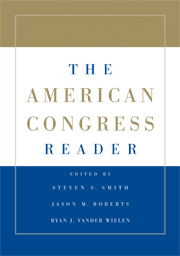Book contents
- Frontmatter
- Contents
- THE AMERICAN CONGRESS READER
- PART I THE AMERICAN CONGRESS: MODERN TRENDS
- 1 What Is Wrong with the American Political System?
- 2 A Reassessment of Who's to Blame
- 3 Between the Campaigns
- PART II REPRESENTATION AND LAWMAKING IN CONGRESS: THE CONSTITUTIONAL AND HISTORICAL CONTEXT
- PART III CONGRESSIONAL ELECTIONS AND POLICY ALIGNMENTS
- PART IV MEMBERS, GOALS, RESOURCES, AND STRATEGIES
- PART V PARTIES AND LEADERS
- PART VI THE STANDING COMMITTEES
- PART VII THE RULES OF THE LEGISLATIVE GAME
- PART VIII THE FLOOR AND VOTING
- PART IX CONGRESS AND THE PRESIDENT
- PART X CONGRESS AND THE COURTS
- PART XI CONGRESS, LOBBYISTS, AND INTEREST GROUPS
- PART XII CONGRESS AND BUDGET POLITICS
- PART XIII FURTHER READINGS ON CONGRESSIONAL POLITICS
- References
3 - Between the Campaigns
Public Approval and Disapproval of Government
Published online by Cambridge University Press: 05 June 2012
- Frontmatter
- Contents
- THE AMERICAN CONGRESS READER
- PART I THE AMERICAN CONGRESS: MODERN TRENDS
- 1 What Is Wrong with the American Political System?
- 2 A Reassessment of Who's to Blame
- 3 Between the Campaigns
- PART II REPRESENTATION AND LAWMAKING IN CONGRESS: THE CONSTITUTIONAL AND HISTORICAL CONTEXT
- PART III CONGRESSIONAL ELECTIONS AND POLICY ALIGNMENTS
- PART IV MEMBERS, GOALS, RESOURCES, AND STRATEGIES
- PART V PARTIES AND LEADERS
- PART VI THE STANDING COMMITTEES
- PART VII THE RULES OF THE LEGISLATIVE GAME
- PART VIII THE FLOOR AND VOTING
- PART IX CONGRESS AND THE PRESIDENT
- PART X CONGRESS AND THE COURTS
- PART XI CONGRESS, LOBBYISTS, AND INTEREST GROUPS
- PART XII CONGRESS AND BUDGET POLITICS
- PART XIII FURTHER READINGS ON CONGRESSIONAL POLITICS
- References
Summary
Stimson observes that the public approval of Congress and legislators moves in tandem with approval of presidents and governors, along with trust in government generally and confidence in the economy. He infers that Congress's approval ratings are driven primarily by the public's judgment about whether things are going well in the country.
He had famously asked, “Are you better off than you were four years ago?” He had known the answer would be “no.” He had said he could do better. Now, in April 1982, Ronald Reagan was in trouble. After a year of relatively good outcomes in 1981, the U.S. economy came full circle, from stagnation to modest growth, and now crashing into full-scale recession. Reagan's early approval ratings had been strong, often in the upper 60s. He had averaged upper 50s. Now as the economy started to slide, so, too, did Reagan's standing. It was low 50s in the fall of 1981 and dropped below fifty briefly in November. After one rebound, it went below 50 and stayed. By April he was at 43. It was not as low as he would go.
Ronald Reagan surely knew the insider's rule of thumb about approval and reelection: Below 50, you lose. Not precise and not based on many cases, the rule of thumb nonetheless had a perfect track record. Voters and consumers had been pessimistic in October 1980, when Reagan had asked, “Are you better off?” Now their pessimism had sunk lower still. Production was declining.
- Type
- Chapter
- Information
- The American Congress Reader , pp. 16 - 28Publisher: Cambridge University PressPrint publication year: 2008

